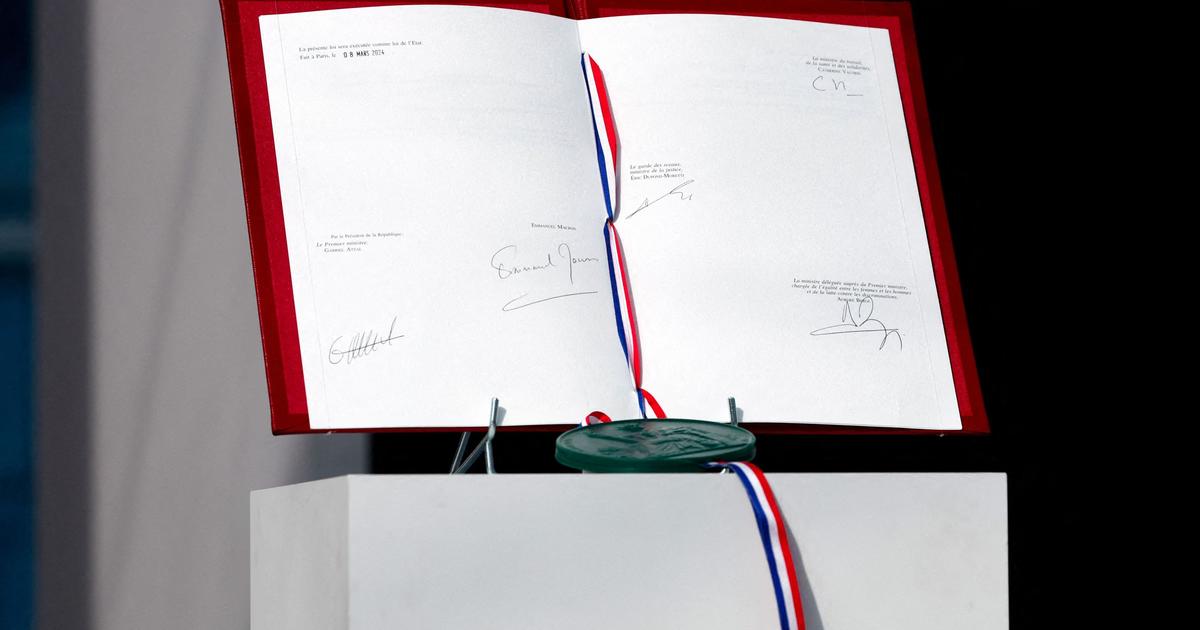Mural installed on the occasion of International Women's Day on the facade of the headquarters of the Ministry of Equality, in Madrid's Calle de Alcalá, Santi Burgos
This time the big date is not on the street.
The pandemic also forces us to vindicate International Women's Day, in Spain and in the world, without the mass demonstrations of the last editions.
In Madrid, the courts have prohibited even small concentrations in a year in which the feminist movement has more demands than ever: to labor gaps, sexist violence, the lack of conciliation, the advance of the extreme right that denies inequalities or the precariousness adds the effects of the health crisis.
"Women in Spain today work more than men, but they are poorer," the Government summarized in its institutional statement.
The European Institute for Gender Equality (EIGE, for its acronym in English), alerts of 2.2 million jobs lost by women in Europe, especially in Spain, with a decrease of 9.2% between the second quarter of 2019 and that of 2020. They have been 70% of health workers and caregivers who have been on the front line to fight the virus, according to the UN, which warns that violence against women has become "a shadow pandemic."
One in five has quit work in this crisis to care, according to a survey by MalasMadres.
Together, feminism demands a solution to all these issues but drags up to this 8-M a division that is not new and that in recent months has led to a very virulent confrontation staged especially on social networks: the debate on the draft of a new
trans law
and its possible effect on equality policies.
The prohibition of demonstrations in Madrid ends in the Constitutional
The Laws of Equality That Bury the Political Struggle
Last February, the Ministry of Equality made public the draft of that law, which provides for free self-determination of gender (change the sex on the DNI without any requirement other than the express declaration).
Part of the feminist movement, grouped in platforms such as Against the Erasure of Women or Confluence of the Feminist Movement, considers that understanding that sex is chosen puts at risk the achievements and laws that are based on inequality.
There is division within the Government.
The PSOE has not yet allowed the draft to advance.
And also within the parties: the position is not closed between the socialists and neither within United We Can.
Militants and councilors of this party yesterday launched a manifesto in which they demanded a "public and internal debate on the implications of the policies" of self-determination.
Feminism “is the most attacked theory in history;
that has always happened, it is not something new ”, explains Rosa Sansegundo, president of the University Platform for Feminist and Gender Studies and professor at the Carlos III University.
"Dividing it is a great patriarchal triumph and it is intended to stop its great social and convening advances," adds this expert who delves into history to remove iron from this latest disagreement: "The more you know the past, the better you interpret the present.
In the French Revolution, women were guillotined.
And in 1931, when Clara Campoamor and many others advocated divorce, the movement fractured within the political parties.
There is nothing new, only advances and retreats.
After the Second Republic, women did not imagine that during the dictatorship they were going to be considered minors.
Maybe now we don't imagine that we can lose our rights ”.
"There is no mutual reproach," Soledad Murillo, a feminist and former Secretary of State for Equality with the previous socialist government, considers about the disagreement.
He applauds the positive part of the law, which "includes a guarantee not to stigmatize trans people."
But she is among those who demand a calm debate: “They cannot say that there is a phobia if we ask that women born female not be called cis or binary, pregnant or bleeding people.
At the United Nations, the most conservative countries talk about people and thus avoid recognizing the gender gap or the existence of discrimination.
It is necessary to analyze the consequences ”.
The same is claimed by the feminist writer and journalist Nuria Varela: "The draft of this law calls into question all the equality and gender violence policies developed in Spain."
Varela denounces "false debates" in the disagreement regarding the
trans law
.
“They are talking about a fight between two political parties without taking into account that there is a lot of feminism outside of them.
Nor is it a generational discussion, nor do I think it is so great within feminism, but rather between a certain trans militancy and part LGTBI against the majority of the movement.
The feminist activist Justa Montero defends the draft and assures that she is surprised by “so much aggressiveness” on an issue that they considered already integrated, because trans women are part of feminism: “There may be debate on different conceptions, but that the right of women is denied. trans people is incomprehensible ”. Montero, like the rest of the experts consulted, does not believe that this clash weakens feminism, which this year will have to vindicate itself beyond the streets: “It is a powerful and strong movement, considering women as subjects in its struggle. But it does hurt ourselves. For expressing an opinion they receive criticism, disqualification and insults. It is hostile ”.









/cloudfront-eu-central-1.images.arcpublishing.com/prisa/337RINPHARE4HOOH2KPM4XDQRM.jpg)